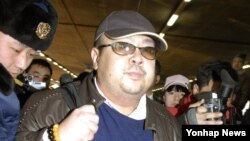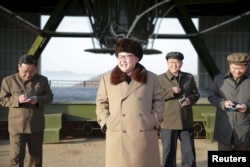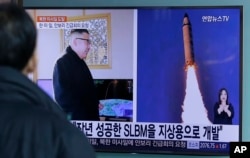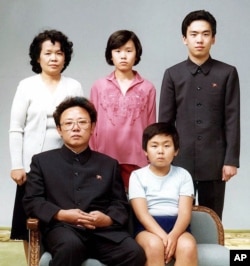It's no real mystery. That's the assessment of North Korea watchers and members of the U.S. intelligence community following the apparent assassination of the eldest son of the totalitarian state's former leader, Kim Jong Il.
According to authorities in Malaysia, 46-year-old Kim Jong Nam — traveling with a passport under the name of Kim Chol — died en route to a hospital after seeking medical help at the budget-flight terminal of Kuala Lumpur International Airport.
Kim, who is the half-brother of North Korea's current leader, Kim Jong Un, apparently was jabbed with a poisonous needle or a cloth by two women, according to South Korean media reports quoting intelligence sources in Seoul.
Intelligence sources in Washington say there is a strong belief the killing was ordered by Kim Jong Un in Pyongyang.
"We are aware of reports" about the death of Kim, a State Department spokesperson said on condition of not being named. "We refer you to the Malaysian authorities."
The National Intelligence Service in Seoul told VOA's Korean Service it could neither confirm nor deny that scenario.
Living in exile
The jovial and portly Kim Jong Nam had lived in exile for many years in Macau, a gambling enclave under China's control.
The Chinese had calculated that the North Korean exile, to whom it had long agreed to host, "would have been preferable as a leader to North Korea," said Georgetown University visiting professor Balbina Hwang. "That in itself is a direct threat to Kim Jong Un and, of course, must be eliminated at any costs, even fratricide."
The two half-brothers apparently had never met (they were born to different mothers, but both shared a father and grandfather — North Korea's revered founder Kim Il Sung). And there had been previous assassination threats against Kim Jong Nam, who was once considered heir apparent. But he fell from grace with his father after he tried to enter Japan on a forged passport to visit Tokyo Disneyland.
During Korea's traditional Chosun dynasty "a brother or an uncle in a royal household is a potential rival to get rid of, including killing," explained Tara O, adjunct fellow of the Pacific Forum Center for Strategic and International Studies.
Kim Jong Un put to death a powerful uncle, Jang Song Thaek, in 2013, according to several defectors from the regime.
Consistent defiance
Assassinating a rival sibling also would be in line with Kim's defiance of international norms, according to Hwang, a former senior adviser on Asian Affairs to the State Department.
His death comes just days after Kim Jong Un again defied international sanctions and fired off a new type of solid-fuel land-based ballistic missile.
"That is actually part and parcel of the message he is trying to send, not just to the United States and Japan, South Korea and others, but also to China, frankly, and also to inside his own regime," Hwang told VOA.
Kim Jong Nam "favored reform, a position China also shares," O told VOA.
Authorities in Malaysia say a dizzy Kim sought help at an airport counter Monday morning after he felt someone grab his face from behind. He was taken to an airport clinic and was referred to a nearby hospital. An ambulance was called.
"Upon arrival at the hospital, the doctor found that he is already dead," Sepang police chief Abdul Aziz Ali.
Two female assailants fled the airport in a taxi, according to South Korean media reports quoting sources.
Pending autopsy
Abdul Aziz says authorities are treating it "as a sudden death case" pending an autopsy that is expected to be performed Wednesday morning at a hospital.
"Only then can we ascertain the cause of death," said the police chief. "Probably we'll refer blood samples and contents of the stomach to the chemistry department to find out what actually caused his death."
Until then, he added, authorities will be unable to say whether the death will be classified "as a murder or not."
Kim Jong Nam's birth resulted from his father's relationship with Sung Hye Rim, a popular actress who died in Moscow in 2002.
Kim Jong Nam had stated he had no desire to lead his country and had criticized, in a 2010 Japanese TV interview, what he termed "third-generation succession." He said he hoped, though, "my younger brother will do his best for the sake of North Koreans' prosperous lives."
The Democratic Peoples' Republic of Korea, under the leadership of a third-generation Kim, is one of the world's poorest countries.
One question being discussed now among analysts is why Kim Jong Un would want his elder half-brother killed at this particular juncture.
The North Korean leader may have been watching the protests in Seoul and "saw how easily the president can be brought down, and thus is feeling insecure," O speculated. "Perhaps he knows loyalty based on fear is fleeting. Perhaps the system is crumbling more than people realize. Time will tell."








